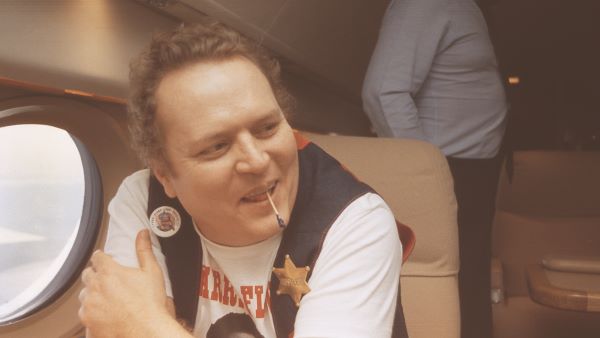
There are few political documentaries as entertaining, timely, and, well, raunchy as Larry Flynt for President, which had its world premiere at this year’s Tribeca Festival. An ill-fated campaign for the 1984 Republican presidential candidacy is the jumping-off point in this compact biography of the self-described “fabulously wealthy pornographer.”
Producer Steve Lindsey’s documentary crew followed Flynt’s presidential bid for a project that was never completed, and that footage has now been assembled and interwoven with contemporary interviews. Director Nadia Szold makes a convincing case that Flynt was the original trash-talking disruptor, tirelessly taking on those in power, particularly the Reagan administration, and most spectacularly the Rev. Jerry Falwell, who sued after Flynt’s Hustler magazine published a 1983 satirical Campari ad in which the televangelist reveals his first sexual experience—with his mother in an outhouse. Oh, and they both were drunk. Falwell sued for libel, invasion of privacy, and intentional infliction of emotional distress. The case went all the way to the U.S. Supreme Court, resulting in the 1988 Hustler Magazine v. Falwell decision in Flynt’s favor.
Szold assumes viewers are somewhat familiar with Flynt and his publishing empire. Her film briefly points out how Hustler skyrocketed to success in the mid-1970s, taking sexual explicitness to a whole new level. Perhaps left on the cutting room floor is the mention that Hustler, in its infancy, landed in the news when it printed photos of Jackie Kennedy Onassis skinny dipping in the Mediterranean.
Overall, the film takes a dive into the culture wars of the 1980s, touching upon the murder of Vicki Morgan, the mistress of Alfred S. Bloomingdale, a member of Reagan’s “kitchen cabinet”; the AIDS epidemic; and the John DeLorean scandal. The film’s time line begins roughly in the late ‘70s with the 1978 assassination attempt on the 36-year-old Flynt. He was shot in Georgia, where he was appearing at an obscenity trial. He couldn’t walk again—he used a gold-plated wheelchair— and became a drug addict because of the pain. More surgery in the early ’80s lessened the suffering, in time for him to hit the campaign trail.
He ran under the belief that government can only be changed by someone from the outside. As portrayed here in the judiciously edited clips, Flynt was ahead of the curve, believing that America would fulfill its promise to be a free society if it were to “come to terms with sexuality.” His campaign, and his magazine, attacked the Republican party’s alliance with the religious right for highlighting cultural issues to distract from what Flynt felt were more endemic problems, including the Reagan administration’s response to the AIDS crisis.
At 90 minutes, the documentary feels a bit truncated, given the subject matter. The film leaves a few loose strands hanging, such as Flynt’s relationship with his younger brother, Jimmy, who at one time fought to become the conservator of Hustler when Flynt was in a federal psychiatric prison for contempt of court, as well as the fate of Flynt’s publishing empire after the rise of free internet porn.
The film’s scope almost sidesteps the accusations of misogyny or his battles with anti-pornography groups. Instead, the director allows montages of Hustler covers and photos to do the talking—the most explicit parts are strategically covered or cropped (otherwise, the movie would presumably face an uphill battle to be viewed by a wider audience). Strangely, there’s no mention of Attorney General Ed Meese’s 1986 report on pornography, which resulted in retail restrictions on the selling of skin magazines (soft- or hardcore) in some commercial venues. Or, that Flynt and Falwell became the oddest of bedfellows, appearing together on a speaking tour debating morality and free speech beginning in the late 1990s.
If nothing else, the documentary frames Flynt as a no-holds-barred defender of the First Amendment, who made it safe for filmmakers and publishers to lampoon public figures, crudely or otherwise.
















Leave A Comment